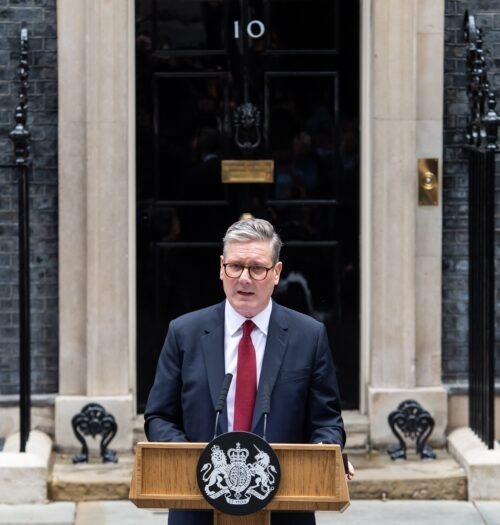As a result of the UK General Election on 4 July 2024, Sir Keir Starmer of the Labour Party has become UK Prime Minister. The Labour Party’s election campaign centred on its ‘Change’ Manifesto, which set out how “Labour’s first mission in government will be to grow [the UK] economy”. As the party takes office, focus now turns to how this ambition, alongside Labour’s other manifesto commitments, will be delivered.
Key climate policy takeaways
- Energy policy is a central focus of the new government’s agenda, with notable commitments including the creation of a publicly owned clean energy company, provisionally entitled Great British Energy—aiming to reduce the UK’s reliance on fossil fuels and enable a zero-carbon electricity system by 2030. In upholding its commitment to meeting carbon budgets and targets, the new government faces a daunting challenge in terms of putting policies in place and implementing them in a timely fashion. There will be a need for significant private capital investment to realise the decarbonisation ambitions outlined in the manifesto.
- Labour has committed to creating both an Industrial Strategy and ten-year Infrastructure Strategy, which are expected to offer clarity to businesses on key net zero industries and infrastructure programmes. NEDs will want to monitor these policies as they develop to assess the potential opportunities for business.
- The Labour Manifesto contains an explicit mandate for UK-regulated financial institutions and FTSE 100 companies to develop and implement credible transition plans that align with the 1.5°C goal of the Paris Agreement. This marks a significant step forward from the FCA’s ‘comply or explain’ regulatory approach to climate disclosure, strengthening the expectations for net zero compliance, which is expected to have material impact on UK businesses’ governance practices.
- This change in government offers an important opportunity for businesses to engage with newly elected government actors. Proactive policy engagement can help align the delivery of the new government’s net zero transition commitments and ambitions with the practicalities and priorities of the business community.
What we know so far about the new government’s climate-related objectives
The following sections outline a number of Labour’s key policy commitments according to its 2024 Manifesto.
- Energy, particularly the green energy transition, has been a central component of Labour’s agenda—the framework for which is set to be established in an Energy Independence Act. One of the most substantial projects the new government has committed to in this area is the creation of Great British Energy (GB Energy), a new publicly owned clean power company for the UK. The ambition behind this is to enable greater government and private sector co-investment in leading renewable technologies and decarbonisation, while lowering energy prices and boosting jobs and energy security. Over this parliament, the plan is to capitalise GB Energy with £8.3 billion. In terms of fully operationalising GB Energy, delivery timelines, as well as cross-sectoral support, remain pressure points for the UK’s journey to net zero—calling for strong reinforcement from the private sector.
- Guided by the pursuit of ‘zero-carbon electricity by 2030’, the new government has committed to end the issuing of new oil and gas licenses in the North Sea and to place a ban on fracking, but stated that it will maintain a ‘strategic’ reserve of operational gas power stations in the UK, and move ahead with the building of new nuclear power stations.
- Regarding outward-facing energy policy, the new government supports introducing the UK Carbon Border Adjustment Mechanism (UK CBAM), which is due to come into force in 2027. Seen as a means to realign the UK’s carbon regime with the EU, this support coincides with Labour’s pledge to create a Clean Power Alliance that will bring together a coalition of countries to strengthen and protect clean energy supply chains.
- This energy focus spans national infrastructure, exemplified in the Warm Homes Plan, which looks to improve energy efficiency by investing double the previous planned government investment to upgrade five million UK homes.
- In order to deliver on climate objectives, the new government has committed to reform the planning system’s role through “strengthen[ing] the presumption in favour of sustainable development” in planning policy (i.e. via updates to the National Planning Policy Framework). Examples of measures in support of this include the announced lifting of the ‘de facto’ ban on onshore wind development.
- Acknowledging the pressures that current planning systems are under, targets such as the new government’s commitment to building 1.5 million new homes in England during the next five years ‘could see an increase in private provision,’ indicating opportunities for businesses to take a hands-on role in national infrastructure delivery, in order to shift the dial on longstanding deficits. As an initial step to achieving this target, Chancellor Rachel Reeves has stated plans to restore mandatory housing targets for local authorities.
- The Labour Manifesto placed strong emphasis on directing capital investment towards strengthening UK industry and investment in innovation. It committed to developing a ten-year infrastructure strategy, to help ‘give the private sector certainty on the project pipeline’ and attract investment. The strategy is set to emphasise the importance of UK SMEs, as well as public bodies—understanding that UK public sector investment has lagged other advanced economies for more than 15 years and is the second most volatile among advanced economies. In hopes of counteracting this volatility, the new government is set to establish a National Infrastructure and Service Transformation Authority, bringing together existing government bodies to streamline strategic infrastructure projects.
- The manifesto recognised the potential for local delivery of key infrastructure programmes, with the new government committing to working with local government to “transfer power out of Westminster, and into [UK] communities”. This will involve extending devolution for Combined Authorities, predominantly in England, as well as providing councils with multi-year settlements and ending competitive bidding—all of which may bring some balance to local government finances. There remain uncertainties around how this devolution extends to public services, with wider concerns around regional imbalance. The Prime Minister and Deputy Prime Minister, Angela Rayner, have outlined plans for a devolution bill, to set out deals with local authorities covering “everything from public transport to infrastructure to skills funding.”
- In terms of fiscal outlook, during the election campaign Labour promoted a ‘securonomics’ approach, in which pro-growth policymaking is maintained alongside safeguarding for strategic investments in infrastructure and services. According to the new government’s Green Prosperity Plan, economic security will be achieved in partnership with business through the National Wealth Fund, which will be backed by £7.3 billion of investment in sustainable industries and create 650,000 jobs by 2030.
- There is acknowledgment that, considering recent green policy instability, attracting and securing business investment in UK green growth is critical, with the new government believing that the “current business rates system disincentivises investment”. In a related commitment, Labour pledges to reverse the Conservatives’ decision to prevent the Bank of England from giving due consideration to climate change in its mandates—a move that is projected to help mobilise private capital into UK net zero industry and innovation.
- The new government has stated its intention to develop an Industrial Strategy, identifying industrial priorities and sectors including the automotive, steel, maritime, green hydrogen, and carbon capture industries which are key for net zero. Proposed commitments for the automotive sector include restoring the 2030 phase-out target for new petrol and diesel cars, as well as £1.5 billion to fund new automotive gigafactories.
- A number of preliminary initiatives to support these industries have been presented, including:
- Scrapping short funding cycles for key R&D institutions, in favour of ten-year budgets.
- Creating a National Data Library, to help deliver data-driven research and support the development of the UK’s AI sector.
- Funding skills development in renewable energy industries, providing a just transition for workforces from carbon-intensive sectors.
- Maintaining an ‘openness of trade’ to support UK businesses in accessing international markets, which will be outlined further in a trade strategy.
- Introducing a land-use framework to deliver more effective environment and land management schemes across sectors.
- As per its manifesto, the new government has emphasised the importance of strengthening the UK’s fiscal rules. In effort to promote greater fiscal clarity, it has committed to “one major fiscal event a year”—presumably the Autumn budget.
- Alongside capping corporation tax at the current level of 25%, the new government will publish a roadmap for business taxation for the next parliament “which will allow businesses to plan investments with confidence”.
- Labour looks to enable regulation in support of investment through setting up a new Regulatory Innovation Office. This office will bring together existing government functions to better monitor the development of new technologies and speed up approval and regulatory timelines.
- The new government is keen to mobilise corporate investment into the UK’s co-operative and mutuals sector, aiming to double the size of the sector. Businesses in this sector are also identified as key partners in developing thousands of clean power projects through GB Energy.
- Transition plans are referenced in Labour’s manifesto, with a commitment to mandate that UK-regulated financial institutions and FTSE 100 companies develop and implement transition plans that align with the 1.5°C goal of the Paris Agreement. Instituting a firm mandate marks a change from the FCA’s ‘comply or explain’ approach to climate-related disclosures, which has been the standard of practice for compliance as with the implementation of the Task Force on Climate-related Financial Disclosures (TCFD).
- UK-EU relations, and their impact on UK businesses’ governance practices, will continue to be a developing policy area, as the new government pledges to an “improved and ambitious relationship” with its European partners, mainly through trade-based improvements rather than revisiting the UK’s membership to the EU. Foreign Secretary, David Lammy, has stated ambitions for a wide-ranging security pact to enable a more close working relationship between the UK and EU across areas including defence, energy, and the climate crisis.
Ways for businesses to engage
- The King’s Speech, which marks the State Opening of Parliament, is on 17 July. Following that, there is likely to be clearer indication of Labour’s transition into government and the initial timelines for forthcoming policies. Businesses and their NEDs will want to stay up-to-date with developments, in order to understand the intersections between corporate strategy and government policymaking, and/or opportunities to bring these into better alignment.
- Business-led engagement can have a positive influence on investment and public spending reform, whether in identifying new finance streams or better ways to spend existing budgets. This feeds into the business community’s capacity to inform central government priorities and trade-offs, helping shape the net zero economic opportunity as it presents itself – particularly in terms of policy delivery (national vs. local net zero delivery, for example). This coordination may help address the ambition gap between government policies and corporate commitments, holding the new government to account on its green policy commitments.
- A major focus of this new Labour government is the ambition to “improve ethical standards in government”, and more active and transparent engagement with businesses could be a practical step forward in this regard.
- There is existing guidance for NEDs looking to participate in responsible corporate engagement, including the Climate Governance Initiative and InfluenceMap’s work on corporate climate policy engagement, which provides a number of guiding questions board directors could be asking, including:
- What climate policy engagement has taken place and/or is planned by the company?
- Are existing policy positions consistent with a climate transition strategy that is aligned with net zero by 2050?
- Has the board mapped all the different channels of influence through which the company seeks to engage on climate policy (e.g. through academia and civil society, via social media, PR, advertising and sponsorship of research)?
- Does the company regularly monitor the policy positions of its membership organisations to ensure alignment? What actions does it take if and when it spots inconsistencies, and how is the board kept informed? Is there an ongoing process of review?
- What disclosures does the company make regarding its individual climate policy engagement, its alignment with industry associations, and any remedial actions taken to address potential inconsistencies between the two?
- There are a number of expected consultations that will inform the net zero policy approach of the new government, for which a diverse business perspective would be valuable. NEDs may be in a position to help facilitate their businesses’ contributions to these consultations, which can be found on the government website as they are announced.
Looking ahead
- The King's Speech will take place on 17th July 2024. We expect further details on the new government's climate policy and implementation plan to be included within the speech. Please keep a lookout on our LinkedIn feed for updates.
- In September 2024, we will release a full quarterly policy update.




